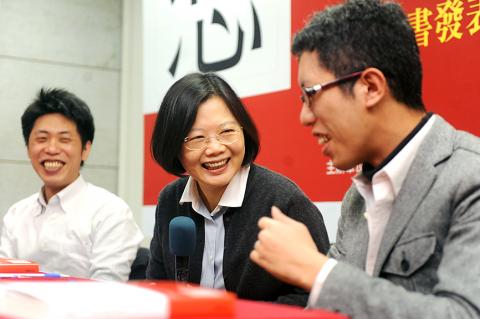Former Democratic Progressive Party (DPP) chairperson Tsai Ing-wen (蔡英文) was reserved yesterday about a proposed grand debate on the party’s China policy, saying that a debate could end up taking away flexibility in handling cross-strait affairs if it was not well-planned.
Speaking on the sidelines of a book launch held by her foundation, Tsai responded to a media inquiry about DPP Chairman Su Tseng-chang’s (蘇貞昌) proposal to hold such a debate, which was initiated after the party’s recently completed review of its China policy was criticized by many as “unimpressive” and “conservative.”
“The [DPP’s] cross-strait policy has always been a sensitive issue of diverse opinions. Part of it is suitable for a debate and part of it is not. A debate could eventually eliminate the DPP’s room for maneuver unless it is well-planned and well-crafted,” Tsai said.

Photo: Liao Chen-huei, Taipei Times
The former presidential candidate said the DPP’s China policy would have to find a balance between its core values and the political reality and “it takes time” to accomplish the feat.
The DPP would have to engage the public in communication as well as with Beijing during the process, she added.
After the DPP’s loss in the presidential election in 2012, several party members called for a debate, which would have been the second “grand debate” on the party’s China policy after the one held in 1998 when Hsu Hsin-liang (許信良) was chairman.
Several DPP lawmakers, including Gao Jyh-peng (高志鵬), Tuan Yi-kang (段宜康), Chao Tien-lin (趙天麟), Hsiao Bi-khim (蕭美琴), Lee Chun-yi (李俊俋) and Pasuya Yao (姚文智) supported the proposal.
Tsai spoke to reporters on the sidelines of a book-launch to introduce Thinking Taiwan — a collection of 82 articles published on thinkingtaiwan.com, an online forum.
The forum, established in August 2012 under Tsai’s Thinking Taiwan Foundation, aims to promote a “New Thought movement” among the public following her loss in the 2012 election, Tsai said, adding that it was not a politically motivated move.
Since its establishment, the Web site has published more than 1,600 articles by more than 500 authors and has on average about 200,000 page views per week, according to the foundation.
The articles, on a wide range of topics, have been thought-provoking as the discussion had gone beyond the conventional “election politics” and market economy beliefs, Tsai said.
She added that it has been a pleasant surprise that 80 percent of the Web site’s readership comes from the under-40 age group and almost half of the authors were born after 1980.
“That eased some people’s concern that young people today know how to gather and process information, but do not know how to think,” Tsai said.
Tsai said she was confident about the emerging civil society in Taiwan and said that political parties would have to reconsider their roles and make adjustments accordingly.

Taiwan would welcome the return of Honduras as a diplomatic ally if its next president decides to make such a move, Minister of Foreign Affairs Lin Chia-lung (林佳龍) said yesterday. “Of course, we would welcome Honduras if they want to restore diplomatic ties with Taiwan after their elections,” Lin said at a meeting of the legislature’s Foreign Affairs and National Defense Committee, when asked to comment on statements made by two of the three Honduran presidential candidates during the presidential campaign in the Central American country. Taiwan is paying close attention to the region as a whole in the wake of a

President William Lai (賴清德) has appointed former vice president Chen Chien-jen (陳建仁) to attend the late Pope Francis’ funeral at the Vatican City on Saturday on his behalf, the Ministry of Foreign Affairs said today. The Holy See announced Francis’ funeral would take place on Saturday at 10am in St Peter’s Square. The ministry expressed condolences over Francis’ passing and said that Chen would represent Taiwan at the funeral and offer condolences in person. Taiwan and the Vatican have a long-standing and close diplomatic relationship, the ministry said. Both sides agreed to have Chen represent Taiwan at the funeral, given his Catholic identity and

Chinese Nationalist Party (KMT) Chairman Eric Chu (朱立倫), spokeswoman Yang Chih-yu (楊智伃) and Legislator Hsieh Lung-chieh (謝龍介) would be summoned by police for questioning for leading an illegal assembly on Thursday evening last week, Minister of the Interior Liu Shyh-fang (劉世芳) said today. The three KMT officials led an assembly outside the Taipei City Prosecutors’ Office, a restricted area where public assembly is not allowed, protesting the questioning of several KMT staff and searches of KMT headquarters and offices in a recall petition forgery case. Chu, Yang and Hsieh are all suspected of contravening the Assembly and Parade Act (集會遊行法) by holding

Lawmakers from the Democratic Progressive Party (DPP) yesterday established a friendship group with their counterparts in Ukraine to promote parliamentary exchanges between the two countries. A ceremony in Taipei for the Taiwan-Ukraine Parliamentary Friendship Association, initiated by DPP Legislator Chen Kuan-ting (陳冠廷), was attended by lawmakers and officials, including Deputy Minister of Foreign Affairs Francois Wu (吳志中) and European Economic and Trade Office in Taiwan Director Lutz Gullner. The increasingly dire situation in Ukraine is a global concern, and Taiwan cannot turn its back when the latter is in need of help, as the two countries share many common values and interests,